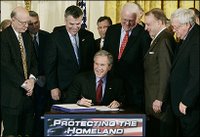Excerpted from Professor Jack Balkin:
The Bush Administration has, over the past six years, detained American citizens without any of the protections of the Bill of Rights, engaged in cruel, inhuman and degrading treatment of detainees, imposed new forms of secrecy to insulate itself from oversight both by the Press and by Congress, used the state secrets privilege to shut down any investigation into its mistreatment of detainees, hid and prevaricated about the evidence justifying, the reasons for, and the cost of Iraqi war, and begun a massive spying program on American citizens. Throughout all of these events, the United States Congress has been essentially supine, unable or unwilling to lift a finger to oppose an executive branch that was simultaneously incompetent, arrogant and out of control. And now, when the FBI catches redhanded a Congressman engaged in the most egregious act of corruption, *now* members of Congress are upset that the Executive is asserting too much authority.
They have their nerve.
Quite frankly, I find the bipartisan closing of ranks over this issue disgusting. If Congressmen are interested in Executive overreaching, they should start demanding that the President justify his NSA program; instead they doing everything they can to paper over its illegalities. They should hold hearings on how the Executive misused and manipulated intelligence reports, hearings that have repeatedly been promised and have repeatedly been postponed. They should hold hearings on the Administrations's policies of no-bid contracts in Iraq and elsewhere, and the many reports of corruption, incompetence, and war profiteering by these very same contractors who didn't have to engage in competition or oversight. They should investigate the President's decisions about torture, about rendition, about detention policies, about, well, you name it-- all the incompetent and corrupt activities of this most incompetent and corrupt Administration.
Be sure to
read the whole thing.
Of course, he's right. Crying "Executive Branch overreach" *now*, after a corrupt Congressman's office is raided and big stack of cash is found in his freezer, is a bit rich, considering the repeated instances of lawbreaking that have been alternatively ignored, supported and minimized by Congress, with only a few notable exceptions (see, e.g. Russ Feingold).
To summarize the current state of affairs:
OK: Torture authorized by Donald Rumsfeld in violation of duly enacted laws and treaties ratified by Congress
Not OK: Catching corrupt Congressmen
OK: Violating several different duly-enacted laws by spying on every American citizen's telephone calls, emails and internet traffic
Not OK: Catching corrupt Congressmen
OK: Seeking an invasion of another country by studiously ignoring all evidence contrary to that goal and failing to tell Congress about all of that evidence you ignored
Not OK: Catching corrupt Congressmen
OK: Setting up a legal black hole in Guantanamo Bay for the express purpose of avoiding judicial oversight, due process and our laws and treaty obligations
Not OK: Catching corrupt Congressmen
Update:
I'm still not willing to cut the Congress any slack on this one, given that they seem to be concerned with overreach only when their own privacy is at issue, and only in an instance where there
was a search warrant. In the words of Homer Simpson, "the ironing is delicious." We are supposed to forget that Congress has ignored warrantless searches through Americans' supposedly legally protected telephone calls and internet activity, and appears to be uninterested in what other secret illegal surveillance programs may be still unrevealed. These illegal warrantless surveillance programs did not garner this kind of consternation--despite the clear affront to Congress in breaking the laws it passed.
Yet, for some reason, we are supposed to believe that
this affront to Congress is different. It seems too coincidental to me that Congress finally decides that a line has been crossed when the issue is investigation of
corruption, an issue many congresspeople probably ought to be concerned about, given the high profile cases involving Abramoff, Ney, Cunningham and Delay, and the widely whispered rumors that many more members of Congress are involved.
These reservations aside, I will admit that there do appear to be good arguments for why the FBI should not be involved in raiding congressional offices.
Digby convincingly slides the slippery slope to the Church Committee's findings concerning abuses by the FBI in the 1960s, noting that "the FBI and the executive branch have a long sordid history of using their power for political ends." A true enough point, as is his reader's comment: "This Republican Justice Department, led by a lifetime Bush loyalist and good friend to Karl Rove now has every Democratic strategy memo that ever came across Congressman Jefferson's desk. Trust 'em?"
Mark Kleiman makes several good points in this regard, and concludes with a warning about "the precedent it will set unless the Congress cleans up its own act" by reinvigorating the
Ethics Committee (
which has done precisely nothing lately about anything).



